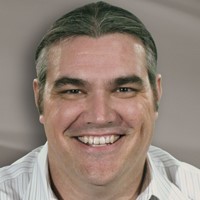I decided to start a series of blogs where I interview key people in the SQL Server community. Instead of me asking technical questions, I plan on asking about their outlook on the future, books they read (non-fiction and/or technical), and their overall thoughts on where technology (mainly SQL Server) is headed. You can find more interviews here.

Mohammad: Where do you see SQL Server technology evolving to 5 years from now? More cloud focused?
Paul: I definitely think that cloud is going to become much more prevalent as a platform and the pace of moment into the cloud will increase. I also hope to see more progress on the ability to work with databases in the 10s to 100s of terabytes – loading, querying, visualizing, and of course HA/DR solutions and backups. I don’t think the SQL Server team can abnegate their responsibility to improve things here – whether that’s in the cloud or the on-premises product.
Mohammad: Do you ever see the traditional SQL Server DBA role being replaced/eliminated?
Paul: Not in the foreseeable future. Simple answer. Databases will always need managing, performance problems will always need to be solved, disasters will always need to be recovered from, and so on. Gradually over time I think we’ll see more automated solutions to these issues, as heuristics and machine learning improve, but I think it’s going to take a wholesale leap forward in machine intelligence for DBAs to be replaced. But when that happens, DBAs being eliminated will be just one tiny piece of the enormous change in employment patterns that will occur around the world.
Mohammad: What are you most proud of doing/accomplishing for the SQL Server community so far in your career?
Paul: I think it’s hard to pin that down to just one thing. Here are some of the things I’m very proud of:
- Running a Product Group-wide project during SQL Server 2005 development to ensure that all areas of SQL Server had a Supportability guide and provided training to Product Support to better enable them to help customers with problems.
- Blogging. In 2016 I had 490 thousand unique visitors to my blog according to Google. That’s an incredible number of people to have helped learn something :-)
- Mentoring 51 community members during 2015 – that was one of the most rewarding things
- Creating and maintaining the SQL Server Waits and Latches library.
- Doing 51 remote user groups presentations since January 2015.
One of the core tenets of life at SQLskills is that we all voluntarily give back to the community in a variety of ways, and I know there are many other in the community who feel and do likewise.
Mohammad: What non-technical/non-fiction book/s would you recommend? If you only read technical books…what do you recommend?
Paul: 5 is way too restrictive. I’m going to cheat and say that my rucksack has an Undetectable Extension Charm (from Harry Potter), so I can take everything on the top-10 list I gave in Insider Newsletter #100 back in February 2015 :-) In no particular order, with Amazon links:
- The Road by Cormac McCarthy (my top book in 2009)
- Shantaram by Gregory David Roberts (my top book in 2010)
- The Lord Of The Rings trilogy (rereading right now)
- The Hitch Hiker’s Guide to the Galaxy ‘trilogy’ (there are actually five of them) by Douglas Adams (last read in 2000 – time to reread!)
- The Aubrey/Maturin series by Patrick O’Brien, such as Master and Commander (last listened to in 2002-3 driving to and from work at Microsoft – time for a reread! – and of course, the utterly fabulous movie)
- The Culture series of sci-fi books by Iain M. Banks, especially Excession and The Hydrogen Sonata (my top book in 2013)
- The Horatio Hornblower series by C. S. Forester (re-read the whole series in 2015 – also love the A&E television series)
- The Harry Potter series by J. K. Rowling (last read in 2007 – must have seen the movies 20 times each – they’re a winter favorite in our house!)
- Travel books by Paul Theroux, especially The Great Railway Bazaar and Riding The Iron Rooster (last read some in 2011)
- Snow Crash by Neal Stephenson (last read in 2012)
Mohammad: For someone who’s career focus has been on one aspect of SQL Server (i.e. Database Engine), do you think it would be wise for them to become a “jack of all trades” by starting to learn, SSRS/IS/Azure, etc. or remain focused on their area of expertise? In another words, which would you say is more valuable? mile wide / inch deep or inch wide / mile deep?
Paul: That’s very hard to answer, as it really depends on what the person wants out of their career and what their intellectual interests are. When I was mentoring in 2015, I had people describe their career goals to me and then fill in a large spreadsheet that had them self-rate themselves in about 100 SQL Server skills areas and another 100 soft-skills areas. Then I gave them advice on what to change. There’s no generalized right answer here, apart from to do the things that will give you the most enjoyment and satisfaction (whatever that means to you – money, knowledge, respect, seniority, whatever).
One Reply to “Interview – Paul Randal”